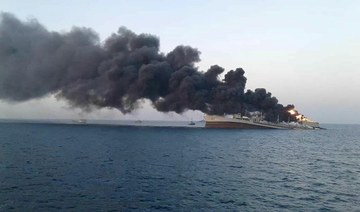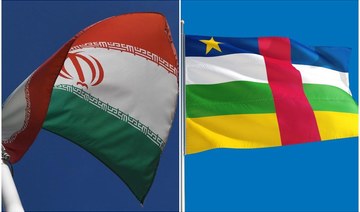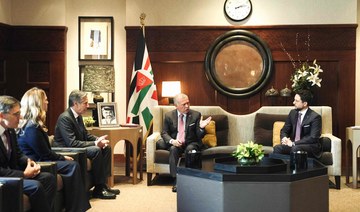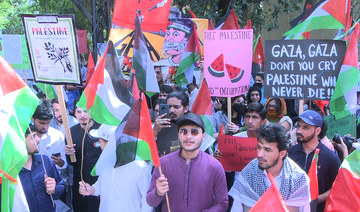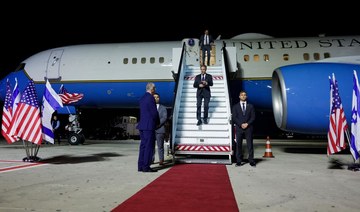TEHRAN: A major fire that tore through an oil refinery in the Iranian capital had been brought under control on Thursday, but was still not completely extinguished.
The blaze broke out at 7:30 p.m. (1500 GMT) on Wednesday after an explosion at the facility caused by a leaking gas pipe, sparking an inferno that left 11 people injured, the authorities said.
“The fire at the refinery has been brought under control,” the official IRNA news agency reported in the morning, citing Shaker Khafai, spokesman for Tehran Oil Refining Company.
A column of black smoke was still visible over the site of the blaze in mid-afternoon, AFP journalists reported, although it was not as thick as the day before.
“Eleven people, including nine firefighters tackling the blaze, were injured,” Mojtaba Khaledi, spokesman for the national rescue service, told AFP.
Four required hospitalization, including three firefighters, he added.
Teams of firefighters were seen battling the blaze in footage from the scene broadcast by state television.
The authorities have launched an investigation into the incident.
The refinery is located in a large industrial zone on Tehran’s outskirts, only a few hundred meters (yards) from residential areas.
It has been in operation since 1968 and has a capacity of 250,000 barrels per day, according to IRNA.
Industrial accidents are common in Iran.
On May 23, nine people were injured in a blast at a plant producing explosive materials in central Iran, local media reported, while three days later, a pipeline explosion at a petrochemical complex near Iran’s Gulf coast left one dead.
Meanwhile, Iran views arch-rival Israel as the top suspect behind two incidents in the past year at its nuclear sites that Tehran has branded acts of sabotage.
Some in the Islamic republic see the various events as the result of attacks by Israeli agents, while others consider US sanctions — which almost completely isolate Iran from the rest of the world, complicating the maintenance of industrial facilities — as a more likely cause.
Oil refinery fire in Iran capital under control
https://arab.news/8gwkz
Oil refinery fire in Iran capital under control
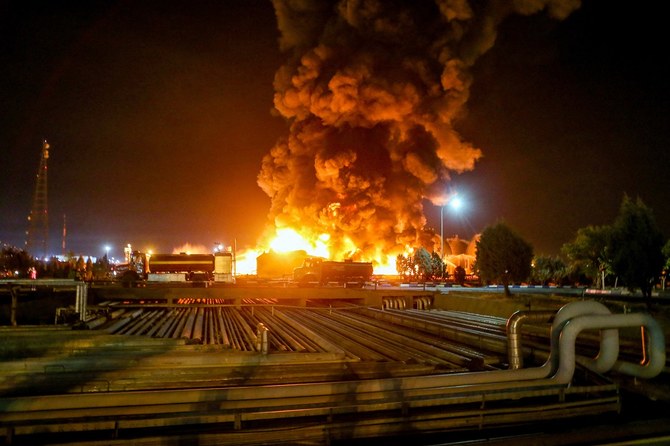
- The fire began at the state-owned Tondgooyan Petrochemical Co. to the south of Tehran on Wednesday night
- Authorities initially suggested the flames affected a liquified petroleum gas pipeline at the refinery
Hamas official insists Gaza ceasefire must be permanent
He stressed the aim was “to reach an end to this war“
GAZA, Palestinian Territories: Hamas will respond to an Israeli truce proposal for Gaza “within a very short period,” an official with the Palestinian militant group said Wednesday, stressing though that any ceasefire needs to be permanent.
Hamas is considering a plan for a 40-day ceasefire and the exchange of scores of hostages for larger numbers of Palestinian prisoners.
Suhail Al-Hindi, a senior Hamas official, told AFP the group would “deliver its response clearly within a very short period,” although he would not say precisely when that was expected to happen.
Speaking to AFP by phone from an undisclosed location, he said it was premature to say whether the Hamas envoys, who have returned from talks in Cairo to their base in Qatar, felt any progress was made.
He stressed the aim was “to reach an end to this war.”
But that would seem to be at odds with Israel’s determination to push ahead with its vast ground offensive in southern Gaza.
A source with knowledge of the negotiations said Qatari mediators expected a response from Hamas in one or two days.
The source said Israel’s proposal contained “real concessions” including a period of “sustainable calm” following an initial pause in fighting and the exchange of hostages of and prisoners.
The source said Israel’s withdrawal from the Gaza Strip remained a likely point of contention.
An Israeli official told AFP the government “will wait for answers until Wednesday night,” and then “make a decision” whether to send envoys to Cairo to nail down a deal.
Jordan says Israeli settlers attacked Jordanian aid convoys on way to Gaza - state news agency
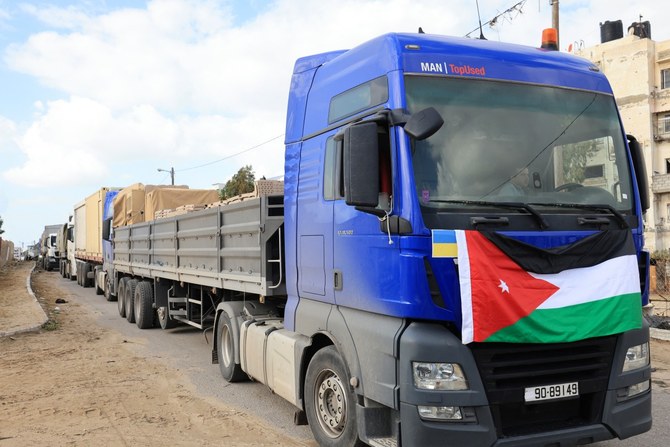
DUBAI: Jordan said some Israeli settlers attacked on Wednesday two of its aid convoys that were on the way to Gaza, the Petra state news agency reported.
“Jordan strongly condemns extremist Israeli settlers’ attack on two Jordanian aid convoys”, it said.
US surgeon in Gaza: nothing prepared me for scale of injuries

- Around 70 percent of the surgeries he performed were on injuries caused by shrapnel
- Team would deal with 40-60 patients a day
CAIRO: A US vascular surgeon who left Gaza after a stint as a volunteer said on Wednesday nothing had prepared him for the scale of injuries he had faced there.
Dozens of patients a day. Most of them young. Most facing complicated injuries caused by shrapnel. Most ending up with amputations.
“Vascular surgery is really a disease for older patients and I would say I had never operated on anybody less than 16, and that was the majority of patients that we did this time around,” Shariq Sayeed, from Atlanta, Georgia, told Reuters in Cairo.
“Most were patients 13, 14, 15, 16 and 17 years of age. Mostly shrapnel wounds, and that was something I have never dealt with, that was something new.”
In his stint at the European Hospital in Gaza, Sayeed said his team would deal with 40-60 patients a day. The vast majority were amputation cases.
“And unfortunately there is a very high incidence of infection as well so once you have an amputation that doesn’t heal, you end of getting a higher amputation,” he said.
Around 70 percent of the surgeries he performed were on injuries caused by shrapnel, the rest mostly from blast injuries and collapsing buildings.
Ismail Mehr, an anaesthesiologist from New York State, who led the Gaza mission, said the volunteer medics were “speechless at what we saw” when they arrived this month in southern Gaza.
Mehr is chairman of IMANA Medical Relief, a program that focuses on disaster medical relief and health care support and has provided treatment to over 2.5 million patients in 34 countries and counting.
He has been to Gaza several times in the past, but could not imagine what he saw this time: “Truly everywhere I saw was destruction in Khan Younis, not a single building standing.”
Out of 36 hospitals that used to serve more than 2 million residents, just 10 were somewhat functional by early April, according to the World Health Organization.
Health facilities lacked medical supplies, equipment, staff, and power supplies, Mehr said. His biggest fear now is an expected Israeli assault into the southern city of Rafah, where half of Gaza’s 2.3 million people have sought shelter.
“I hope and I pray that Rafah is not attacked,” he said. “The health system will not be able to take care of that. It will be a complete catastrophe.”
UAE braced for severe weather, task force on high alert

DUBAI: Challenging weather is again expected in the UAE, with parts of the country’s east coast set to experience strong winds.
The National Emergency Crisis and Disaster Management Authority said gusts of up to 40 kph were likely to impact the area on Thursday.
While the NCM forecasts less severe conditions than those in April, it has warned residents to expect rain and storms over the next two days. There is a possibility of hail in the eastern regions, possibly extending to some internal and western areas.
Clouds are expected to decrease on Friday and Saturday, with possible light to medium rain which may be heavier in some southern and eastern regions.
Government agencies are coordinating with the Joint Weather and Tropical Assessment Team to monitor developments, said a statement from the NCM.
The teams will assess the potential impact of weather conditions and implement proactive measures where necessary.
Dubai’s government announced all private schools in the UAE would switch to remote learning on Thursday and Friday as a precaution.
Authorities have urged the public to exercise caution, adhere to safety standards and guidelines, refrain from circulating rumors, and rely on official sources for information.
The UAE is still recovering from last month’s storms which caused widespread flooding, submerging streets and disrupting flights at Dubai International Airport.
Blinken urges Hamas to agree Gaza truce as he meets Israel leaders
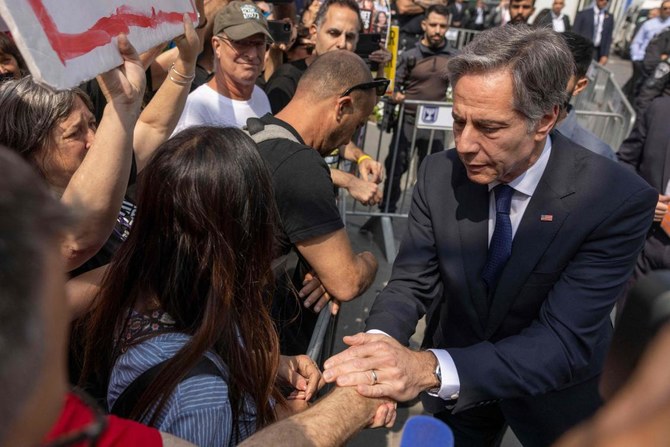
- Washington has heightened pressure on all sides to reach a ceasefire
- Israel said it would wait for Hamas’ response to the truce before sending delegation to Cairo
JERUSALEM: Top US diplomat Antony Blinken urged Hamas to accept a truce in the Gaza Strip on Wednesday, after Israeli Prime Minister Benjamin Netanyahu vowed to send troops into its far southern city of Rafah.
Washington has heightened pressure on all sides to reach a ceasefire — a message pushed by Blinken, who was on his seventh regional tour since the Gaza war broke out in October.
An Israeli official told AFP the government “will wait for answers until Wednesday night,” and then “make a decision” whether to send a delegation to indirect talks being brokered by US, Egyptian and Qatari mediators in Cairo.
The Palestinian militant group said it was considering a plan for a 40-day ceasefire and the exchange of scores of hostages for larger numbers of Palestinian prisoners.
Hamas, whose envoys returned from Cairo talks to their base in Qatar, would “discuss the ideas and the proposal,” said a Hamas source, adding: “We are keen to respond as quickly as possible.”
Blinken put the ball squarely in Hamas’s court.
“There is a very strong proposal on the table right now. Hamas needs to say yes, and needs to get this done,” he said.
But analysts questioned whether Hamas would sign up to another temporary ceasefire like the week-long truce that saw more than 100 hostages released in November, knowing that Israeli troops could resume their onslaught as soon as it was over.
“I’m pessimistic about the option of Hamas agreeing to a deal that doesn’t have a permanent ceasefire baked into it,” said Mairav Zonszein, senior analyst on Israel-Palestine at the International Crisis Group.
Zonszein said the three countries brokering the truce talks had their own reasons for trying to bounce the warring parties into a deal.
“The US and Egypt and Qatar all have very strong interests of their own, for various reasons, why they’re trying very hard now to pressure both sides into agreeing to a deal.
“And I think they believe that if they’re able to get an initial deal and a pause, that they can try to build on that,” he said.
Potential Rafah incursion
Hours before Blinken landed in Tel Aviv, Netanyahu fired a shot across his bows, vowing to send Israeli ground troops into Rafah despite repeated US warnings of the potential for heavy casualties among the 1.5 million civilians sheltering in the city.
“We will enter Rafah and we will eliminate the Hamas battalions there with or without a deal,” the right-wing premier told hostage families, his office said.
Ahead of what promised to be a difficult meeting with Netanyahu in Jerusalem, Blinken too met privately with hostage relatives in Tel Aviv.
In rare scenes for the top US diplomat, who has faced furor at home and abroad over the administration’s support for Israel in its campaign against Hamas, Blinken was greeted outside his Tel Aviv hotel by Israeli demonstrators waving US flags.
Blinken told them that freeing the hostages was “at the heart of everything we’re trying to do.”
The estimates that 129 Israelis remain captive in Gaza, 34 of whom are presumed dead.
Many of their families have expressed hope that US pressure may force Netanyahu to agree a deal for their release.
Mideast tour
On the previous leg of his regional tour in Jordan, Blinken said a Gaza truce and the redoubling of aid deliveries went hand in hand.
A truce is “the most effective way to relieve the suffering” of civilians in Gaza, he told reporters near Amman.
Blinken saw off a first Jordanian truck convoy of aid heading to Gaza through the Erez crossing reopened by Israel.
“It is real and important progress, but more still needs to be done,” he said.
UN agencies have warned that without urgent intervention, famine looms in Gaza, particularly in northern areas which are hardest to reach.
A US-built floating pier on Gaza’s coast is expected to be completed later this week, said Cyprus, the departure point for the planned “maritime corridor.”
Blinken said the pier would “significantly increase the assistance” but was not “a substitute” for greater overland access.
In northern Gaza’s Beit Lahia, across from Erez crossing, 24-year-old farmer Yussef Abu Rabih was replanting plots he said had been “completely destroyed” by the fighting.
“We decided to return to farming despite difficult conditions and scarce resources” after suffering “severe hunger,” he told AFP.
Gaza war
The war started after Hamas’s October 7 attack on southern Israel resulted in the deaths of 1,170 people, mostly civilians, according to an AFP tally of Israeli official figures.
Israel’s retaliatory offensive has killed at least 34,568 people in Gaza, mostly women and children, according to the health ministry in the Hamas-run territory.
Washington has strongly backed its ally Israel but also pressured it to refrain from a ground invasion of Rafah, which is packed with displaced civilians.
Calev Ben-Dor, a former analyst for the Israeli foreign ministry and now deputy editor for specialized review Fathom, told AFP that Netanyahu’s “Rafah comments likely have more to do with trying to keep his coalition intact, rather than operational plans in the near term.”
The prime minister “is feeling the squeeze between the Biden administration” and far-right members of his government who have vehemently opposed the proposed truce, Ben-Dor said.
UN chief Antonio Guterres said an Israeli assault on Rafah would “be an unbearable escalation, killing thousands more civilians and forcing hundreds of thousands to flee.”



